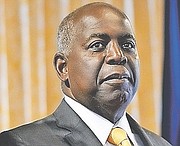By MALCOLM STRACHAN
HAPPY New Year, readers. The ways in which the Christmas holidays fell means it’s been some weeks since my last column – and there certainly has been a lot that has gone on since then.
So what issue should I focus on? There is a lot to choose from.
Perhaps it should be the current surge in murders, which has seen more murders than days of the year so far.
Possibly it should be the Commissioner of Police, who failed to meet his own target two years running with regard to the number of murders, praised a man for begging to be let back into prison who didn’t trust the authorities to keep him alive out on the streets and who admits he has to go back to the drawing board to “see where we could strategise and do some things differently” to fight crime.
We could linger with the Commissioner’s remit and wonder why he needs 14 assistant commissioners when the biggest police force in the UK needs only half that number. We might note that National Security Minister Wayne Munroe sees no problem with that decision and dismissed an audit that recommended the force only needs six such officers, protesting that The Bahamas has more landmass than other forces so needs more officers – although officers manage people, not land.
While we are talking about Mr Munroe, I might note his suggestion that some criminals ought to be subject to monitoring after they have completed their sentence and wonder about both how constitutional it might be for someone to be subjected to a further punishment beyond that which was given by a judge and how it is also tantamount to an admission that there is next to no rehabilitation going on for offenders while they are in prison. No, just release the dangerous criminal and stick a tag on him until we throw him in jail again, maybe after he has killed someone else. It is also worth a thought that arbitrarily being able to place punishments on people beyond the legal process is a dangerous place for a government to be in.
I might take a look over at Junkanoo and wonder if I can place a bet on whether Prodigal Sons will get seed money again for next year’s parade after their double no-show.
I might consider how there is to be a gathering to discuss the nature of the mission for the Bahamas force due to go to Haiti and wonder how if the discussion is only happening now, how relevant could the training be that the forces have already gone through.
I’m sure there is a lot more – it’s been a busy few weeks considering the Christmas period is usually quite quiet in the world of politics.
But I’m going to land on something that rests on one word – accountability.
If you want to roll your eyes and say oh, here he goes, he’s going to talk about freedom of information, then let me reassure you – I am absolutely going to talk about freedom of information. Or the lack of it.
Back in 2021, the nation’s first Information Commissioner was appointed. Keith Thompson, appointed under the Minnis administration, has yet to oversee the release of a single piece of information.
The latest we are told is that he has done all he can do to get the freedom of information pilot programme ready for launch – and now it lies in the hands of the Office of the Prime Minister to provide the technology needed.
The Prime Minister, Philip “Brave” Davis, swiftly poured cold water on the idea that freedom of information might be coming any time soon, suggesting that the government was more focused on fighting inflation rather than providing freedom of information, as if those are the purview of the same departments and as if the government cannot walk and chew gum at the same time. The FNM’s Kwasi Thompson swiftly jumped in to say if the government was really focused on alleviating hardship, it could stop slapping taxes on people, while it was also swiftly pointed out that the spike in electricity prices could have been avoided if the Davis administration had gone ahead with hedging after its election.
PLP chairman Fred Mitchell then piped up to say that “we oppose this Freedom of Information Act idea” and suggesting that anyone can just come and get information from the government whenever they want. Tell that to the reporters who have been asking for who filed their public disclosures on time since the deadline in March, and while you’re at it, feel free to publish all the contracts awarded by the government since it came to power.
But no, Mr Mitchell says: “There’s no issue with information being disclosed in this country.”
Mr Mitchell tried to deflect, saying: “The issue right now is high prices flowing into the high prices in the country. That’s an issue. The issue is how are we going to stop these young men from killing one another every day? That’s an issue. Freedom of information? I don’t think so.”
He added: “And it’s bureaucratic, expensive to execute, and I’m not sure you get any results from it that people can actually see.”
For that latter point, it is simple enough to look at other countries with freedom of information in place to see examples. In fact, handily, back in 2015, when a UK politician railed against the freedom of information act, the UK Guardian newspaper rounded up 103 such examples from the first half of the year alone, including stories on contracts, allegations of spying, government expenditure, police departments losing electronic devices, details of toddlers being stopped and searched by police, the cost of detaining criminals, flaws in election processes, sexual abuse, and a government decision to allow a paedophile to keep a knighthood.
I would be remiss not to note that after Mr Mitchell’s statements, the government fired off a statement saying that the Office of the Prime Minister “wishes to make absolutely clear the Davis administration’s commitment to the implementation of the Freedom of Information Act. Minister Mitchell, in a recent Nassau Guardian article, affirmed that the government is actively moving forward with the FOIA’s implementation. This step underscores our unwavering dedication to ensuring transparency and accountability in governance, integral to our democratic principles and the public’s right to information.”
All is well, then. So as the government is so dedicated, and as Mr Mitchell says that there is no problem with information being disclosed, allow me to make my own premature freedom of information request: By what date will it be fully implemented?
I eagerly await the answer.








Comments
Use the comment form below to begin a discussion about this content.
Sign in to comment
Or login with:
OpenID